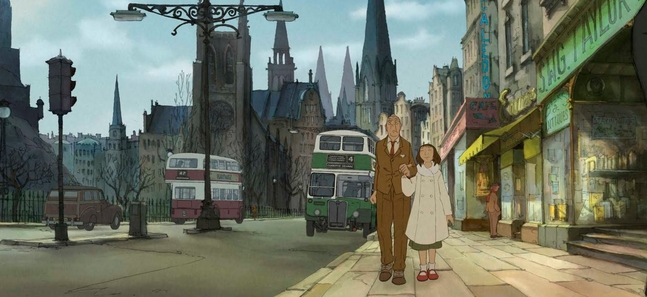Sylvain Chomet: interview
The writer-director on the trials of making The Illusionist

Posted: Tue Mar 08 2011
On the train down to Cannes in 2003, where his frolicsome animated feature Belleville Rendez-Vous was having its world premiere, writer-director Sylvain Chomet had some reading to do. He had a document other filmmakers would kill for, a never-filmed script by French comedy great Jacques Tati, the director, writer and star of Monsieur Hulot's Holiday and Playtime. However, Chomet recalls that his attitude was far from reverent: 'I hoped it was crap.'
'I didn’t want to do an adaptation,' explains the Paris-born animator. 'I wanted to make my own stories. I was ready to give it back to the Tati estate, but that didn’t happen. It was just so strong. I could see the whole movie already, and that’s such a gift.' A gift indeed, and Chomet has spent the intervening years turning The Illusionist into pure pleasure for us. Deliberately old-fashioned in its hand-drawn detail, even radical in its gentle pace, this poignant story follows a struggling magician in the dying, late-'50s days of variety, tracing his fatherly relationship with a waif-like young girl who joins him on his travels. The result is a startling combination of pictorial loveliness and wonderful melancholy. It's nothing less than a modern classic, though it hasn't been achieved without a few bumps and scrapes along the way...
Ever since Chomet approached Les Films de Mon Oncle – the Paris company run by the late Sophie Tatischeff to keep her father Jacques Tati's flame alive – to use some Tati footage in Belleville Rendez-Vous, his fortunes have been linked with the Tati legacy. It has also brought him an unexpected share of controversy, since troubled domestic issues in Tati's past have come to haunt Chomet's new film.
Chomet never met or even spoke to Tatischeff, who died in 2001, but sets great store by the confidence shown in him by her colleagues, who gave him the script with the wish that 'the cinema of Tati must be alive'. Thanks to Chomet and his animators, Tati inhabits the screen again in The Illusionist, since its central character, a down-on-his-luck magician billed as 'Tatischeff', reflects the loping gait and befuddlement of Monsieur Hulot. Indeed, the connection between the two runs deep: Chomet recognises the influence of Playtime on his desire for gorgeously composed, long-held wide shots which leave us to find our own way round the frame.
'Tati hated close-ups, and there aren’t any in this film,' Chomet points out. 'It's something young viewers might take some getting used to, because there’s no fast-cutting. It's not like an amusement park ride. So they’ll have to slow down, to let the emotion work on them.'
The beauty and immersive detail of the images, whether the changing skies over Edinburgh or a steam train beside a Scottish loch, cast their own spell – and they’re very much Chomet’s doing, since Tati’s original story was set in Prague. A visit to the film festival in Edinburgh in 2003 was enough to have Chomet and his producer wife fall in love with the Scottish capital and move their entire operation there. Fittingly, The Illusionist opened this year’s film festival, screening to applause in the very same venue where the Tatischeff character in the film performs for a few stragglers. However, the rumour mill hinted at acrimony during the film’s gestation, something Chomet puts down to, 'some people with a, shall we say, Hollywood sensibility who wanted the délicat things to be cut' – and he credits co-producer Pathé for supporting him.
Unknown to Chomet, though, he was also walking into another battle. What he didn’t realise at the time of reading the script was that Tati had had an illegitimate daughter during the war, Helga Marie-Jeanne Schiel, whom he abandoned and never recognised. In turn, her son, Richard McDonald, has conducted a campaign alleging that the script for The Illusionist is long-overdue recognition for his mother, so he is incensed at Chomet’s dedication of the film to Sophie Tatischeff. Chomet’s response is: 'I’m not the Tati estate and this has nothing to do with my work.' But he adds that 'the script was written around the time of Tati’s film Mon Oncle, so he was away a lot from home and feeling as if he would wake up one day and Sophie, his little girl, would be a woman.
'That’s what the film is about,' he maintains. 'Not knowing what to do as a father. My daughter was 12 when we started and now she’s 18. I put a lot of my experiences into the film, because if you’re going to tell this story, you have to have lived it. It can’t be about someone you haven’t ever spent time with.'
The Illusionist opens across Tokyo on March 26
Tweets
- About Us |
- Work for Time Out |
- Send us info |
- Advertising |
- Mobile edition |
- Terms & Conditions |
- Privacy policy |
- Contact Us
Copyright © 2014 Time Out Tokyo














Add your comment